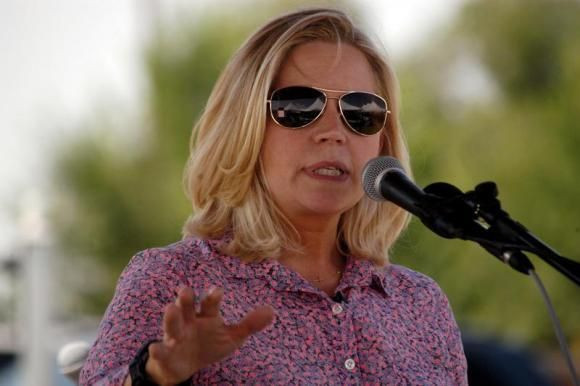Why Did Liz Cheney Withdraw From Senate Race? Health, Polls, And Family Feuds All Played A Part

One day after Liz Cheney, daughter of former Vice President Dick Cheney, bowed out of her Republican primary campaign against Wyoming Sen. Michael Enzi, questions still remain about why Cheney left the campaign -- and why she began it in the first place.
In her official statement delivered Sunday night, Cheney, 47, pinned her withdrawal on “serious health conditions,” but refused to elaborate any further.
“Serious health issues have recently arisen in our family, and under the circumstances, I have decided to discontinue my campaign,” Cheney announced in a statement on her website. “My children and their futures were the motivation for our campaign, and their health and well-being will always be my overriding priority.”
“As a mother and a patriot, I know that the work of defending freedom and protecting liberty must continue for each generation,” she continued. “Though this campaign stops today, my commitment to keep fighting with you and your families for the fundamental values that have made this nation and Wyoming great will never stop.”
Though Cheney cited health issues for her withdrawal, the former Senate candidate refused to clarify as to what exactly those issues entailed. While it’s certainly likely that some unspecified health issues played a part in Cheney bowing out of the race, there’s certainly more to the story than Cheney’s statement lets on.
From the start, Cheney’s campaign was a long shot. After moving to the Jackson Hole area from the north Virginia Washington D.C. suburbs in 2012, Cheney almost immediately sought to undermine well-liked three-term incumbent senator Mike Enzi. Such a move would be reckless even for someone with long-lasting ties to Wyoming. Certainly, her family has deep ties to the state, as Dick Cheney represented Wyoming for five terms before progressing to the upper echelons of Republican leadership, but Liz Cheney herself is relatively new to the area.
Cheney’s opponents were wise to this, and Enzi’s supporters labeled her a carpetbagger. It didn’t help matters when Cheney claimed to be a 10-year resident of the state when purchasing a fishing license two months after moving to the state. Cheney’s application should have been denied, as she did not meet the minimum one-year residency requirement at the time.
The Cheney family’s complicated relationship with same-sex marriage also played a large part in Cheney’s unpopularity both in and outside of Wyoming. Enzi, 69, has a solidly conservative record against same-sex marriage, but Cheney’s family history made her own stance on the issue less clear. Cheney’s younger sister Mary is a lesbian who married her longtime partner Heather Poe in 2012. In response to attack ads from the American Principals Fund, Cheney clarified that she was strongly opposed to same-sex marriage, despite her sister being in such a marriage herself.
Though the move was designed to broaden Cheney’s conservative appeal, it infuriated her sister Mary. Both Mary Cheney and her wife posted statements attacking Liz Cheney online, catapulting the family spat to the national stage. Though family patriarch Dick Cheney issued a statement taking Liz’s side in the debate, the damage had already been done for Cheney’s PR and her reputation within the family. Speaking to the New York Times, Mary Cheney said that she had not seen or spoken to her sister in months, and that she would not see her sister during the holidays.
Ultimately, these issues made Cheney extremely unpopular in Wyoming. A poll conducted in November found that Enzi led Cheney with a remarkable 52 point spread among likely primary voters, with Enzi taking 69 percent of the vote and Cheney only 17 percent. The same polling group found in August that Enzi was only up 40 points, signaling Cheney’s rapidly descending public opinion in Wyoming.
By the end of the year, the writing was on the wall for the Cheney campaign. Facing impossible odds, it would have taken a veritable miracle to ensure Cheney’s election, whether or not family health concerns arose. Instead of asking why Cheney withdrew from her Senate campaign, a better question might be: Why did Cheney choose to run in the first place?
© Copyright IBTimes 2025. All rights reserved.






















